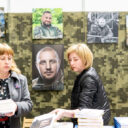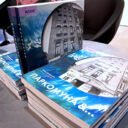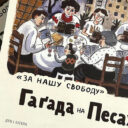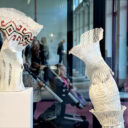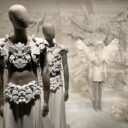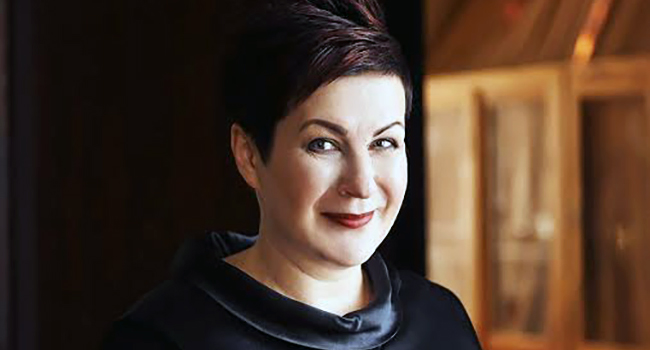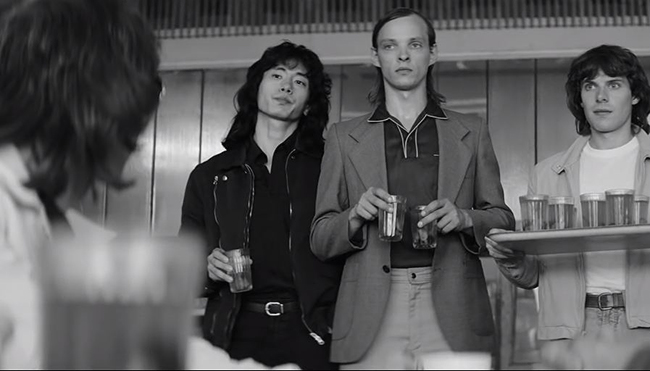Conductor of the Kyiv Chamber Orchestra New Era Orchestra Tatiana Kalinichenko.
What qualities should a conductor have?
– I am not sure whether it is a quality, but a conductor should love music very much and this is the main thing. Qualities… I read somewhere that a conductor should have inexhaustible patience. And I agree with that. Moreover, will power and sense of purpose. This is one of those professions that can’t be described with five or ten points. I can’t name five or ten qualities that are necessary for a conductor. Everything is important, I guess. Even human flaws (all people have flaws and weaknesses) should work for you, if you are a conductor. I would like to return to this question later on.
Of course. Do you think that this profession has a certain “gender”? I mean is there any gender stereotype in the conducting sphere?
– Yes. Moreover, it’s not a reaction of musicians, everything’s easy with them: you are either a conductor or not. Evidently, this comes from the outside, there is always a special emphasis, it is always separately emphasized that a conductor is a woman. It’s said that the era of female conductors has begun, people state more often that among women there are some good conductors. And it is always done with some kind of anticipation and separation within the general pool of conductors. But the world is changing fast.
Does it grate on your ears, when you hear people refer to you as Maestro?
– No, I’m very pleased.
New Era Orchestra is already 11 years old, but I assume your conducting experience is much more considerable?
– Yes, I have been conducting for much longer. Once, I tried to count … Formally, conductors start to count their experience from the date they receive a music diploma. I received one in 2003, and in 2004 I started to work. However, to me this kind of thinking is wrong. An aspiring conductor must undergo an incubation period, understand what he can do. Especially, at times, when he thinks he can do everything, but in fact, he knows very little. The most importantly, he should understand whether this profession suits him or nor. Realization that you know and can do too little, paradoxically comes only when a conductor already knows something and can perform it.
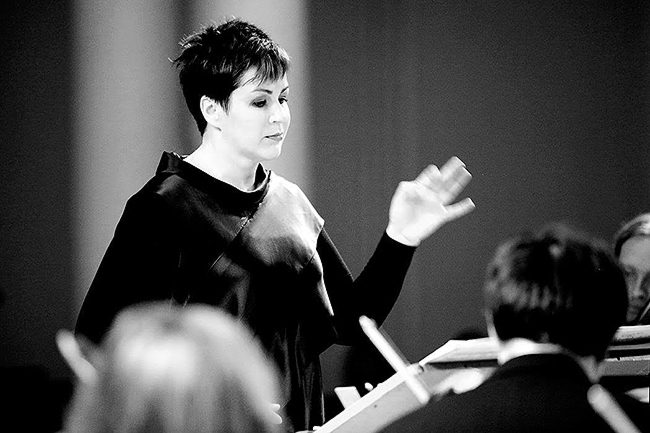
Is there difference between tasks you set for yourself then and now?
– In 2004, I had access to the orchestra, I constantly invented something, it was possible to rehearse a lot and for a long time. I don’t think I was aware of my tasks, I was so interested in everything I was doing: a real orchestra, and I really go to work and work as a conductor! The understanding of the tasks, apparently, came in 2007, when New Era Orchestra was created, and I had to think about what I was doing, why I was doing it, what I wanted, and where I would go. Crystallization of these issues and goals took more than one day. Now our tasks (our – because it is difficult for me to tear myself from the orchestra, we are a single organism) are to take a course to the “highest musical league”. This is a big task, and there are several internal tasks related to local projects in Ukraine. But in fact, they are connected, a breakthrough into the international music league is possible when there is an active musical movement at home, in Kyiv, in Ukraine.
Do you need to play a lot here?
– Yes, I would like to do it more often, but I haven’t figured out how to do it yet.
There are not enough venues for you or they don’t exist at all?
– So far, the only venue that meets international requirements (for acoustics and other positions) is the Philharmonic. It’s great that it exists, but it is only one place, yet, we have not figured out how to regularly perform there.
In short, we don’t have a system that allows us to play more concerts yet. The second, after the venue, is the issue of complex financing. We are still moving from concert to concert, every time a new project is a feat, every time each project starts from scratch.
Do you want to conduct opera?
– Yes. Who’s calling? I love opera, I would be happy if I could do it. I don’t see how for now. But opera is my big dream.
How do you define the repertoire of New Era Orchestra? Do you hone technique, try to be remembered by the rare scores, or on the contrary, play popular ones?
– One of the strengths of New Era Orchestra is interesting programs. I’m developing, the orchestra is developing, the world is changing rapidly, and in a huge amount of music you need to choose the one that you would like to perform. In a combination modern music and classics strengthen each other, with this combination, the whole program wins.
The question on interpretation: can a conductor fundamentally deviate from the score and covenants of the composer?
– What is “fundamentally?”
To decide that in a certain place he will do differently from what’s prescribed. There are also other tools – rhythm, pauses.
– There is a principle “a little bit” that I like. This “a little bit” sometimes can radically change a lot – the concept, reading, this “a little bit” has a great potential of change. But externally, it is one of the little things the performance consists of. One of the main tasks of a conductor is to make these little things interesting (not in the sense of looking specifically, where would I arrange such “a little bit”). It means to open the music so that it would be interesting to listen to. Let’s try this, and maybe change “a little bit” in this place, or maybe we’ll pause in this place – these small details are not noticeable separately, but they are visible in the complex and from the side.
A lot of things grow and develop from the principle of “a little bit”, and mainly the impression of the orchestra’s performance. I have never set myself the task of simply “changing”, the main thing is how to perform the piece on the highest possible level.
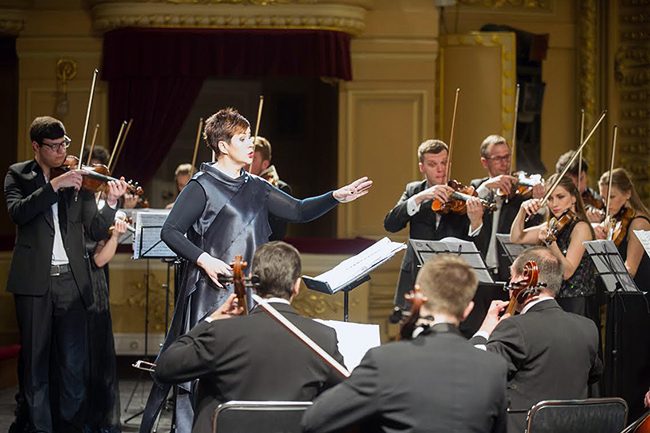
That is, every little thing must be justified. Do you discuss this with the orchestra?
– Not that we discuss absolutely everything …. Important things are negotiated and regulated during rehearsals. My task is qualitative execution… This is particularly true of “supposedly simple material”, when it seems that there is “nothing to play”. This is a mistake, there are externally complex works, they can be hard to rehearse and very easy to perform. Deceptively simple texts always have reefs that you need to be able to see. As a rule, the more musical experience you have, the harder it is to play a simple piece in a cool way. I think the attention to small details is important – if you know how to detect them, it turns out unexpectedly well.
Do you hold a feedback meeting with the orchestra after the concert?
— Not on purpose. We don’t have a repertory committee, but if we have the opportunity to record sound and video, we study the fragments and compare opinions. When there is an opportunity, we analyze the moments that were successful, and those that were less successful. Everyone participates in this discussion, but we don’t sit together literally, at the same table, all this happens on the Internet.
What determines the quality of the orchestra?
– It is a complex issue, I don’t want to quote Bulgakov and his fish of the second freshness. There is no fish of the second freshness, it is either fresh or rotten. So, the same thing is about orchestra: it’s either good, or … not very good. It’s audible. It’s seen. Here you can write a 300 pages tract. The conductor of the team must always learn, this affects how the musicians play.
So, the conductor determines the quality of the orchestra. Do your musicians study? Do you force them?
– I would say the opposite: it’s me who is constantly learning, working with such great musicians. Orchestra and conductor should be interesting for each other. In order to achieve this, both sides have to be in motion, do something, develop. The more conductor listens (in the literal sense of “listening”) to the musicians – the orchestra’s performance itself (you won’t believe it, not everyone does it, you need to learn it) – the better he can influence the process. And do not interfere with the musicians’ playing. Everyone in the orchestra learns from each other.
How many casts of musicians have you already grown up, four?
– It’s difficult for me to say how many. There has always been the core of the team since the foundation of the orchestra. It can’t be permanent too, we have been living in a sessional, kamikaze regime for 11 years already. This is an orchestra without a permanent residence residence permit and funding – and it somehow miraculously manages to do extraordinary things. Therefore, it is difficult to talk about the cast: a lot of people have been replaced. Quite clearly, I can say: I always have students in the orchestra. There are not many of them, but they are always there. It is important.
There are neophytes who remember “how it should be ” from the theory, and there are mastodons who know “how it should be”.
– Students can see where they can take an example. When they get into the company of very serious musicians, there is a rapid growth, evolution.
And sometimes students have something to say.
What do students give to experienced musicians?
– We need to ask the musicians. It seems to me that this is a mutual flow. When a person first comes to me for a rehearsal, he marks our special atmosphere. And probably I’m the only one who can’t explain it, because during the work I am completely absorbed by it. In the orchestra, there is an inspector who reminds the conductor about the regulations and breaks. I absolutely don’t fit this position, all the sense of time is fading away while we rehearse, and the musicians discipline me: “Tanya, we’re rehearsing for an hour and a half, we need a break!” It’s not because of disrespect for musicians.
In a word, everyone feels our special atmosphere almost immediately. I was recently asked a question “what is special about New Era Orchestra?”, I don’t know, maybe you need to come to the rehearsal and see. I like the orchestra and the musicians, I’m inspired by the work with the orchestra. If you have a strong, sincere passion for something, you feel it, and it works like a magnet.
Apart from work and rehearsals, what else inspires you?
– Travelling, beautiful picture, new places, where I (of course) look for concert halls, this is how it’s going. Wherever I go, I’m looking for an opportunity to go to the concert.
What do you dream about in terms of New Era Orchestra?
– I dream that there is a modern concert hall in Ukraine, and if more –a modern concert complex with different halls: chamber, theatrical, experimental … It’s not my kind of highly specialized dream: “only for me.” Many people dream about it. We have nothing to offer to the orchestras except for the Philharmonic, and this is one small, albeit good, hall for 650 seats. We can’t make exchanges and collaborations with other orchestras, as the whole world does, the whole world exchanges experience. Our country could become a place where musicians – conductors and orchestras – meet. We could be partners with the rest of the music world and become a welcome country for the tours. Many musicians leave, they see excellent halls, interesting concert programs, movement and life.
I would like us to work this way too. I don’t know what to do to make it real, sometimes I take active steps to bring it closer. I have already been told several times: “Tanya, you will not succeed!” Ten times different people told me this, and it seems to me nevertheless that it will work.
Do you look at the conductor on purpose at concerts of other orchestras?
– Sometimes it’s impossible not to look. I was at the Salzburg Festival, Gustavo Dudamel was conducting the Venezuelan Orchestra, it was a Broadway production of “West Side Story”, starring Cecilia Bartoli. It’s impossible not to look at Gustavo Dudamel! He’s a firework, a fountain, walking music! In a word, of course, I’m interested in watching conductors, especially if it’s a good conductor.
I dream to attend Kirill Petrenko’s rehearsals, now he is the chief conductor of the Munich and Bavarian operas, from 2019 he will become the chief conductor of the Berlin Philharmonic. I have already studied all information about him that is available on the Internet, he is an outstanding conductor.
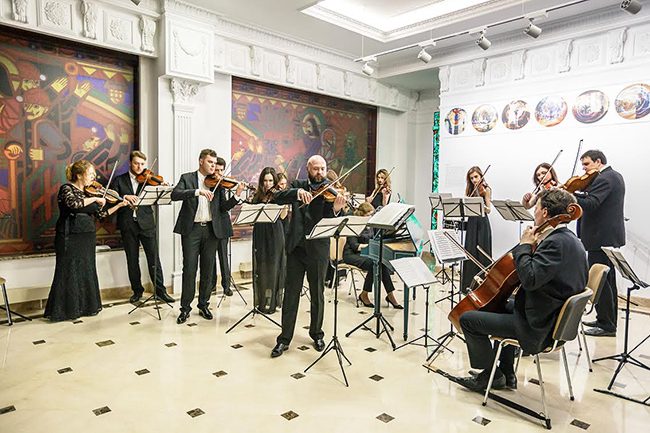
Conductors sometimes conduct without a baton. Is a baton important?
– I’m conducting with my hands, it became more convenient at one point. It’s very individual. There are formal rules that it’s necessary to conduct with a baton, it’s technically justified and understandable why it should be so.
Each conductor chooses for himself. After all, it’s not important whether you conduct with a baton or not. The result is important, if the orchestra understands you. How understandable is the impulse that comes from the conductor. Now a baton hinders me. There were concerts when I started with a baton, then put it on a console, then I accidentally lost it, the master who manufactured batons (the only one in Kyiv) died, I had no one to order from… I’m not the only conductor who conducts without a baton. Usually I work without a conductor’s podium, side by side with the musicians — it can also be dangerous to do it with a baton, I can hurt someone.
Conductor’s gestures can be interpreted “in the wrong way”, it’s not the Morse code, is it?
– Gestures of the conductor are secondary. I like to watch when a conductor performs a bright, filigree technique, I always look at it and notice: “Wow, I also need to do this!”, It’s important, but it’s … secondary. If your gestures interfere with your interaction with the orchestra, it’s terrible. Of course, there are certain canons taught in the conservatory, and all conductors must learn them. I always ask musicians: “Is it clear or not clear? Something was not clear? ” If musicians didn’t get it, it is necessary to change the gesture.
Are you a democrat or a dictator as a conductor?
– I guess I’m trying to combine. And, probably, now I will answer your first question. I was recently told that they say about me: “Have you survived after Kalinichenko?!” The conductor should have a temper, if he doesn’t, it will be very inconvenient. The conductor does not work with instruments, but with people, with gifted people, his task is to reveal their capabilities. I can be a dictator, but without emergency I will not.
It is impossible to be a conductor without a sense of proportion and sense of humor. There is so much humor in music. If the conductor doesn’t see it, how can he conduct! And heshould also be a diplomat, especially if he has a strong personality. One must be able to be tolerant and to avoid direct answers if they provoke aggression. The orchestra sees when the conductor is diplomatic and what efforts he puts into it.
You entered the conductor’s faculty almost immediately after the birth of your child. Does your daughter play music?
– I was applying during pregnancy as well, I got accepted on the third time, and it’s not a case of ” bad teachers, how could they do that?!” – twice I failed, because I was poorly prepared (but at that time I thought I was prepared brilliantly, but now, of course, it doesn’t seem so), I didn’t meet the requirements, but I needed to breathe that air. My daughter Vlada was surrounded by music and tours throughout her childhood. She studies at the Academy of Arts and Architecture, in the architectural department. When she was three years old I talked to her about the future, and she told me: “Mom, I will not be a musician”. Since then, she has not changed her mind. Her thesis will be about the modern concert hall.
*******
The nearest New Era Orchestra concert will be held on June 25, and it will be outstanding:
In the program: Grieg-Vivaldi-Bach-Mendelssohn-Bartholdy-Brahms.
Soloists that will perform with the orchestra:
Kit Armstrong, piano, USA / Andrej Bielow, violin, Germany / Andrey Pavlov, violin, Ukraine / Artem Poludenny, cello, Ukraine
- What: New Era Orchestra concert. Armstrong / Bielow
- When: June 25, at 19:00
- Where: National Philharmonic, Volodymyrsky Descent, 2
Check out English version of our interview here

